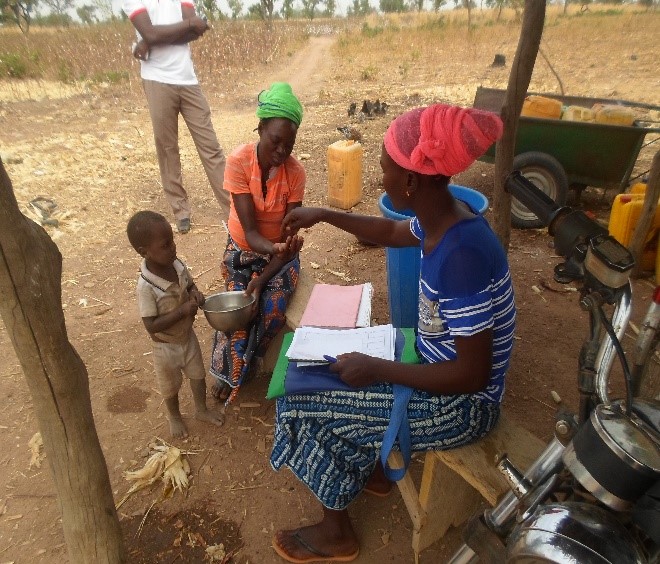In Sinaperedouo, a village in the Sud-Ouest region of Burkina Faso, 28-year-old Bibata and her husband Issa, a 33-year-old gold miner, are overjoyed because Bibata is expecting a third child—and relieved to know that, thanks to the Jhpiego-led Improving Malaria Care (IMC) project, she will be protected against malaria throughout her pregnancy. The IMC project engages community health workers (CHWs) to deliver antimalarials to pregnant women in their villages, ensuring that women who live far from a health center receive this essential health care.
Sinaperedouo is home to approximately 715 people, including 135 children under age five. As in most of the region, malaria is a major concern in the village, which has no health center or health worker. The nearest health facility is in Midebdo, seven kilometers away. To attend her antenatal consultations, Bibata must travel this distance on foot—a journey can take three hours each way.
Antenatal consultations give the women of Sinaperedouo the opportunity not only to have the progress and health of their pregnancies checked, but also to receive preventive services against diseases such as malaria. During the consultations, women receive an insecticide-treated bed net, and starting in their second trimester, women receive three tablets of sulfadoxine-pyrimethamine (SP) to protect against malaria.
Malaria carries higher risk for pregnant women because the infection can cause maternal anemia and low birthweight, both of which can be life threatening. In extreme cases, malaria can cause spontaneous abortion or maternal death. Thus, access to antenatal care is critical to ensure that Bibata and other women in her region have access to antimalarials for a safe and malaria-free pregnancy.
For her second child, Bibata only attended two antenatal consultations before the delivery—not enough to protect against malaria. It was not possible for her to leave home and travel the seven kilometers for all eight of the recommended consultations.
This time, however, Bibata had received three doses of SP by her sixth month of pregnancy, though the health center is no closer.

Beginning in 2018, the seven-year IMC project, led by Jhpiego with funding from the U.S. President’s Malaria Initiative through the U.S. Agency for International Development (USAID), implemented a community-based intermittent preventive treatment of malaria in pregnancy (CIPTp) intervention that leverages CHWs to reach pregnant women in the region’s villages. The CHWs are trained on the use of SP to prevent malaria, including how and when to administer it.
A total of 468 CHWs in 234 villages in the districts of Batie, Ouargaye and Po have received training through IMC, conducted by Centre de Santé et de Promotion Sociale health workers with support from the health district management team. Pauline, one of the two CHWs from Sinaperedouo, is satisfied with the training she received: “This training allows us to provide [antimalarial] medication directly to pregnant women and to raise awareness about how to stay healthy during pregnancy.”
Thanks to the work of Sinaperedouo’s CHWs, Bibata receives care close to her home: “After the first antenatal consultation, the midwife referred me to Mrs. Pauline, one of the CHWs in our village, for malaria prevention. Every month, she comes to ask about my news and gives me the three pills that I take in front of her. She asks me questions about my health and gives me advice on how to make the pregnancy go smoothly. In the village, we are currently seven women who are being monitored. This is a great relief for us.”
Midwife Noelie from the health center noted, “We are seeing a marked improvement in the number of women receiving SP since the community IPTp intervention began. This is also an opportunity for me to thank the donors and hope that this strategy can be applied to all villages in Burkina Faso to improve health indicators.”



